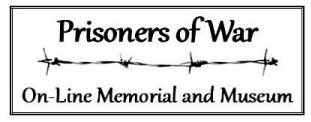Peter Henry Blaskey – Capture, POW life, Long March, 2005 visit to Stalag VIIIB
From: Bishop Jonathan Blake
Sent: Thursday, April 23, 2015 4:31 PM
My father, Peter Henry Blake, known then as Sergeant Peter Henry Blaskey, rarely spoke about his wartime experiences, an approach common among his peers.
On the night 10/11th September 1942, 89 Lancasters formed part of the 479 bomber force which attacked Dusseldorf, the target being well marked by Pathfinder Force aircraft. This led to heavy damage on the city.
Five Lancasters were among 33 aircraft lost on this operation. Sergeant P.H. Blaskey the pilot, Sergeant Hemmings the flight engineer and Sergeant Kean the bomb aimer became prisoners of war.
Sergeant Havenhand the navigator and Sergeant Young and Sergeant Cartwright, both air gunners, were killed. They are buried in the Reichswald War Cemetry.
Stalag VIIIB
My father was imprisoned at Camp 344 – Stalag Lamsdorf, Stalag VIIIB. They were amongst a small group who, as a reprisal from the Dieppe raid, on the specific orders of Hitler were chained and manacled for a period of six months.
He was issued with a metal identity tag on a neck cord, ‘Prisoner 27036’ and the word ‘Jew’. He never wore it
The prisoners slept on bunks, three high, on straw filled mattresses under a single blanket in a barrack housing 120 men. Only cold water was provided, even during the harsh winters and the latrine consisted of holes above a pit over which the men squatted together.
They suffered continual hunger, not helped by the thin barley soup they were fed.
The Diary
My father’s diary covers the period from November 12th, 1942 until September 6th 1943.
It is chilling to know that he remained in the camp until January 18th, 1945. One is left to imagine how he managed to cope with what must have seemed an endless captivity.
Snow had fallen the day the Camp leader announced to the prisoners that they had to be ready to leave the camp in one hour’s time.
The 600 mile march
The guards removed the wire fencing at the side of the camp and marched the men onto the bleak moorland. My father marched with his ‘oppo’ Mark Mead, with whom he had completed his operational training at R.A.F Abingdon.
Mark Mead’s aircraft had been shot down over Belgium and coincidentally he was imprisoned at Stalag VIIIB.
Mark Mead wrote ‘ Peter and I spent the next two and a half years together, gaining mutual support during some extremely rugged times. Peter once said that, without me, he would not have survived. In turn, I received vital support from Peter and encouragement when things looked depressing and desolate.’ (From ‘A Long Walk Home’ 2009)
On the long march they were warned that anyone falling behind would be shot. The conditions were severe.
The Route
From Lamsdorf, near Oppeln in Poland they were marched through Neisse, went south of Dresden towards Chemnitz onto to Jena, then to Erfurt and Eisenach, finally reaching Ziegenheim to the south of Kassel. It was a journey of some 600 miles and took 11 weeks to complete.
1000 men had started together, but only 200 arrived.
My father spoke rarely of the ordeal. He remembered walking while ‘asleep upright’; men collapsing beside the path and being shot when trying to forage for food and an abiding memory of a farmer’s wife giving them apples as they passed by.
They slept outside often, at times in temperatures as low as minus 15 degrees centigrade, huddling together for warmth and taking it in turns to suffer the edge position, waking covered in snow.
My father was caught on one occasion gathering turnips. That night he was tied to a tree and the guards carried out a mock execution.
Rescue
When the men arrived in Ziegenheim, they slept for the first time in tents on straw mattresses and when they awoke all the guards had vanished.
Later that day, the Americans arrived.
My father was severely emaciated and was admitted to hospital on his return to England.
The Heroes Return
He died in September, 2005. He had been ill with cancer since the beginning of the year. However he was well enough in the June to join in one of the Royal British Legion’s 60th anniversary commemorations, a trip back to Stalag VIIIB. It was very moving that he shared the return too with his ‘oppo’ Mark Mead.
I had the privilege of accompanying him on the journey as well and sharing the camaraderie and reminiscences of his fellow prisoners of war.
There were many poignant moments, not least walking amongst the foliage and the trees that have now colonised the remaining prison structures and watchtowers.
However, one moment was unexpected. As we disembarked the bus by the train station at which the prisoners had arrived, an elderly woman came to enquire as to the purpose of our visit.
When we told her, her eyes filled with tears and she embraced the men. She had been 17 when she remembered the men being marched past her village into the camp.

Leave a Reply
Want to join the discussion?Feel free to contribute!